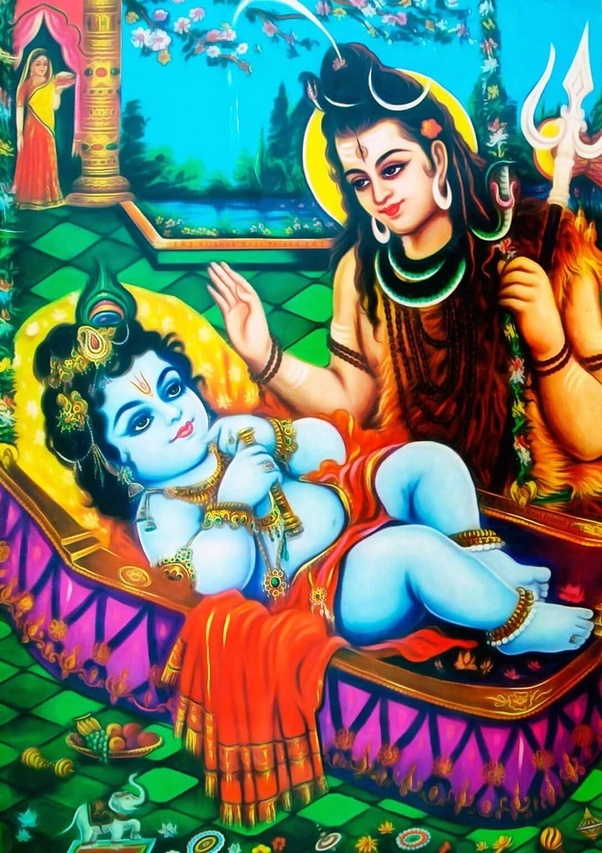Question: I have a question that is bothering me. I went last year to see MATA AMRITANDAMAYI also known as AMMA. She is a big devotee of Lord Krishna, always speaks of Lord Krishna’s glories. She has the same message to humankind that our place is with the Lord and that we have to go back to Lord Krishna. My question is, I have seen devotees of Amma chanting “om nama shivaya”. So I am confused. What is the difference between the maha mantra and this mantra? I hope you would enlighten me on this.
Answer by Romapada Swami: Before directly answering your question about the two different mantras, I would like to give a short prelude about the process of Krishna-bhakti.
Pure Devotional service to the Supreme Personality of Godhead Krishna is a great science. Although it is very simple that even a child can perform devotional service under proper guidance, it is also very scientific and has to be learned carefully from learned and authorized devotees. Just as in a scientific experiment, if some procedures are not followed properly it may not yield the desired result and may even prove dangerous, similarly also the science of bhakti-yoga has to be carefully understood and applied.
Srila Rupa Goswami, one of the great Vaishnava acharyas, cautions us that devotional service which is not performed according to the injunctions of the authorized scriptures is simply a source of disturbance:
shruti-smrti-puranadi-pancaratra-vidhim vina
aikantiki harer bhaktir utpatayaiva kalpate
“Devotional service of the Lord that ignores the authorized Vedic literatures like the Upanishads, Puranas and Narada-pancaratra is simply an unnecessary disturbance in society.” (Bhakti-rasamrita-sindhu 1.2.101)
It is for this reason that Lord Krishna Himself spoke the entire Bhagavad Gita in which He clearly delineates the spiritual science and the Vaishnava acharyas in disciplic succession have also written so many elaborate and authoritative books explaining this science for our benefit. Those of us who aspire for devotion to Krishna should take full advantage of these literatures and familiarize ourselves with this science. It may be beneficial for anyone to simply chant or hear the Holy Names of the Lord with devotional sentiments and aspire to go back to Him, but if one wants to systematically cultivate their devotion and make tangible progress towards the goal of reaching Lord Krishna’s lotus feet, it is imperative that they approach a qualified spiritual master, who comes in disciplic succession, and learn this science – this is the Vedic recommendation.
With that background, I can address your question in light of what the scriptures teach. According to Bhagavad Gita, Krishna is the Supreme Personality of Godhead, the source of all spiritual and material worlds, and from whom everything is emanating. (Bhagavad Gita 10.8) For the affairs of managing the material creation, He expands as Mahavishnu who is the source of Lord Brahma, who in turn appoints many demigods such as Indra, Candra, Ganesha etc, in charge of universal administration. Lord Shiva is considered the chief of all these demigods, and he himself is a transformation of Lord Vishnu, although he is not the Supreme Godhead himself. The example given is that of yogurt, which is a transformation of milk, but is neither the same as, nor entirely different from its cause viz., milk. (Brahma Samhita 5.45)
It is certainly very auspicious to worship and chant the names of Lord Shiva, for he is most exalted and one of the greatest devotees of Lord Hari, “vaishnavanam yatha shambhu”. In fact, he himself is a spiritual master and head of a vaishnava sampradaya (disciplic succession) and he teaches pure devotion to Lord Krishna. Yet, shastras teach that one does not derive the same benefit from the worship or chanting of the names of Lord Shiva as the worship of the Supreme Lord.
Krishna conclusively states in the Bhagavad Gita that different kinds of worshipers attain different destinations: “Those who worship the demigods will take birth among the demigods; those who worship the ancestors go to the ancestors; those who worship ghosts and spirits will take birth among such beings; and those who worship Me will live with Me.” (Bhagavad Gita 9.25) The same idea is conveyed in the Isopanishad also: “It is said that one result is obtained by worshiping the supreme cause of all causes and that another result is obtained by worshiping what is not supreme. All this is heard from the undisturbed authorities, who clearly explained it.” (Isopanisad Mantra 13)
Isopanishad further recommends that we approach such learned and undisturbed authorities to clearly understand who that supreme Cause of all causes is, and simultaneously also know what the temporary material creation is with its temporary demigods, men and animals. Without such clear knowledge, it is possible that our innate tendency for worship and devotion of someone superior to us may be misdirected towards something other than the Supreme Absolute Truth. This will be like the example of performing a science experiment with a wrong ingredient! Such persons, despite all their devotional sentiments, can not achieve the desired result not to speak of giving it others. One who actually knows these truths perfectly, however, he surpasses death and the ephemeral cosmic manifestation with it, and in the eternal kingdom of God he enjoys his eternal life of bliss and knowledge. (Cf. Isopanisad Mantra 14)
As far as the Hare Krishna mahamantra is concerned, it is a direct prayer to the Supreme Personality of Godhead and even amongst the many Vedic mantras addressing the Supreme Lord, this particular mantra is recommended in the Upanishads and Puranas as the ‘Mahamantra’, and as especially beneficial for the present age of Kali. (Cf. Kali Santarana Upanishad 5)
I hope this clarifies your doubt.
(Further discussion about the position of Lord Shiva can be found in Digests 100, 89, 240 & 43)







